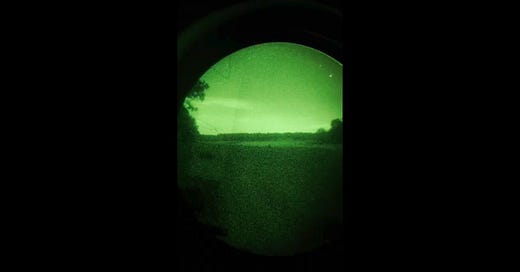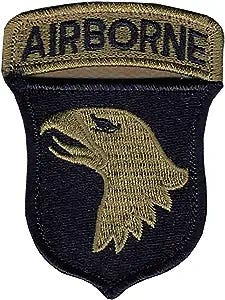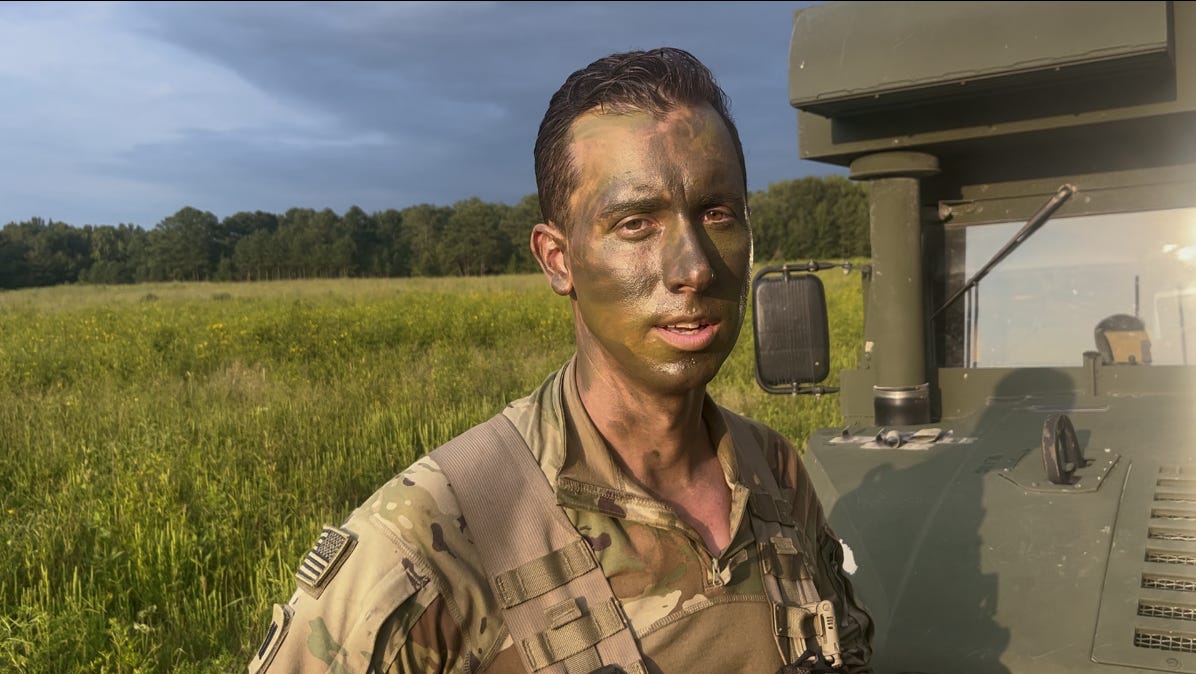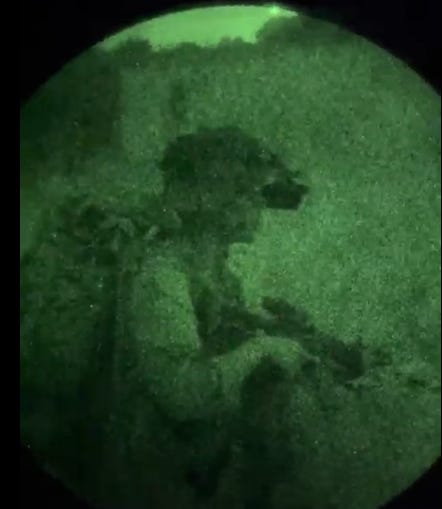The infantry scouts of Shadow Troop, 1-33 C, 3-187 BCT, 101st Airborne take a knee in the tall grass of the landing zone. We move by helicopter soon.
This seemingly routine task takes on an entirely different complexion due to the cover of darkness. With the moon shrouded behind clouds and the absence of artificial light sources, the landscape is transformed into an abyss of pitch black.
The 101st Airborne’s symbol is a bald eagle, which is a diurnal predator. But the scouts of the 101st hunt at night.
Everything in the 101st Airborne revolves around how much movement can get done in one POD - or Period of Darkness. Every field soldier in the 101st Airborne division has a night vision optic and the soldier is expected to do their job while wearing night vision - whether it’s flying a helicopter or walking through the woods.
Tonight’s mission will be to fly from the PZ, or Pickup Zone to the LZ, or landing zone via two UH-60 Black Hawks and then walk 800 meters through thick brush to the “objective,” which was a live fire range.
Capitan Ty Weaver, the Commander of Shadow Company, is exhausted. The unit has been in the field for 17 days straight, moving at night, hiding during the day and never staying in more than one place for long. Yet he still found the time to talk to me about his mission.
When you move during the day, you put yourself at risk, you lower your survivability.”
-Captain Ty Weaver, Commander Shadow Company, 1-33 Cav
The 101st Airborne trains the way they fight. Moving by bus or tactical vehicle during the daylight, would have been less risky, but the Shadow Company takes every opportunity it can to hone their craft. This comfort with night movement is what makes Shadow Company so dangerous to the enemy.
"When you move during the day, you put yourself at risk, you lower your survivability," explains Captain Ty Weaver, Commander of Shadow Company, 1-33 Cav.
So you take the risk of accidents in training in order to be more lethal in combat.
As the Russians learned during the Battle for Hostomel Airport, moving by day is death - either by Man Portable Air Defenses (MANPADS), self-propelled anti-aircraft guns (SPAAGs) or plain old angry infantrymen massing rifle fire. Russia’s botched Air Assault of Hostomel Airport will go down in history as one of their invasion’s missed opportunities.
Russia doesn’t have the time or equipment for night fighting at scale, but it is just another night for Shadow Company.
Shadow Company's scouts epitomize elite warriors, entrusted with scouting ahead of air assault forces to gather crucial intelligence. Their role is observational rather than confrontational, providing insights on targets. Along the way, they meticulously analyze terrain features, ensuring the attacking force is armed with data ranging from hydrology to bridge load capacities.
Their dwell time is limited only by the amount of water they can carry - which is usually 72 hours worth, although it’s possible for them to be resupplied by air if they can accept the additional risk.
As two UH-60 Black Hawks approach, the auditory backdrop differs from the typical "whop-whop-whop" reminiscent of Vietnam War films. The sound carries the swift cadence of a baseball card affixed to a child's bicycle spokes, interwoven with an overpowering high-pitched whine akin to an immense hovering Dyson vacuum.
Upon touchdown, the helicopter is reborn as a "Chalk," a term rooted in airborne history, when distinct chalk marks designated load assignments. Each Chalk is managed by a Chalk Leader, responsible for safe embarkation and disembarkation of soldiers.
Guided by Chalk 1 leader Staff Sergeant Long, soldiers embark, leaving their rucksacks outside the bird before taking their seats. The leadership remains outside, ensuring a headcount before hurling rucksacks into the helicopter, creating a mound around the occupants. Despite being designed for 11 soldiers, space is scarce.
Loading a Black Hawk takes five minutes, a deceptively simple task complicated by the pitch-black environment, reminiscent of navigating a crowded airplane aisle while looking through a paper towel tube.
The helicopter ascends into the night sky.
After a brief ten-minute journey skimming treetops, the Black Hawk lands, and soldiers spill out in a semicircle, prepared to fend off potential attackers.
The Black Hawk departs, solitude envelopes the night.
The scouts host their rucksacks on their back and we begin the long walk over rough terrain to the objective. The men bear their 100 pound burdens silently, moving swiftly, tactically, and with purpose.
I am struck by the courage of these men. It’s one thing to put on a 100 pound rucksack and get on a machine that’s trying its best to vibrate itself apart.
It’s another thing to step off that bird into the unknown. That’s where the fear lurks.
But for the the infantry scouts of Shadow Company, this gap of fear is bridged by training, narrowing the chasm between apprehension and valor.
As the night’s veil embraces every step, these soldiers know that they only have a few days left before the end of the exercise. They’ll return to their barracks. They’ll get their first real shower in weeks. They’ll eat some hot food.
But they’ll be out here again soon, and none of them would have it any other way.

















Share this post